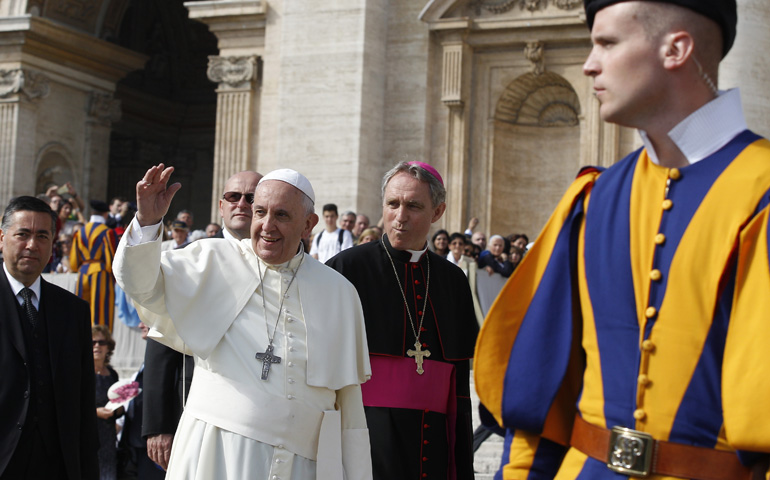
A Swiss Guard keeps watch as Pope Francis greets the crowd during his general audience Wednesday in St. Peter's Square at the Vatican. (CNS/Paul Haring)
Everyone has a special gift to offer the whole church, just make sure it is used to serve everyone and not to puff up one's own pride or to create division, Pope Francis said.
"It is a gift that God has given to someone not because he or she is a better person than someone else or because she or he deserves it," the pope said Wednesday at his weekly general audience in St. Peter's Square.
God gives gifts freely, out of love, so that they can be "put at the service of the whole community for the good of all people," he said.
The pope continued a series of talks on the nature of the Catholic church, focusing on charisms or precious gifts the Holy Spirit bestows on individuals for the edification of the church.
"But what is a charism exactly? How can we recognize it and receive it?" he asked.
In the wider sense of the word, most people think of a charism as having to do with a particular talent or skill or a certain kind of charm seen in people who get labeled as "charismatic," he said.
But in the Christian sense, it's more than that; it is "a grace, a gift bestowed on us by God the Father through the action of the Holy Spirit," he said.
Critically, these gifts have to be discovered and acknowledged within the wider church community, the pope said. "Someone cannot figure out by himself if he has a charism and which one."
It's a bit like that kind of person everyone has heard about, "who says, 'Oh I have this talent, I know how to sing so well.' And yet no one has the courage to tell him, 'Hmm, it's better you keep your mouth shut. You torment us when you sing,'" the pope said to applause.
It's only within a community and with its recognition and encouragement that people can discover what their unique charism is, he said.
"It's good for each one of us then to ask ourselves, 'Is there some kind of charism the Lord has made evident in me?'" and then reflect on how that gift is used. "Do I live it with generosity, putting it at the service of everyone or do I neglect it and end up forgetting about it? Or maybe it has become a source of pride" and jealously, he said.
"There's trouble in store if these gifts become sources of envy, division or jealousy," he said.
The church, he said, should not be afraid of the huge array and variety of charisms out there. Rather than being seen as "a problem" or a cause for "confusion or discomfort, they are all gifts that God gives the Christian community so that is can grow in harmony, in the faith and in his love as only one body, the body of Christ."
The Holy Spirit is the one that creates this multiplicity of gifts, he said, and the one who unites them in their diversity.
The pope said people could follow the example of one of his favorite saints, St. Therese of Lisieux, whose feast day is celebrated Oct. 1.
She loved the church so much, she wanted to do everything, "she wanted to have all the charisms" out there, in particular, to be a missionary, the pope said.
So she prayed and reflected on what she should do "and she felt that her charism was love" -- to be the love that's in the church's heart, he said.
"We all have this charism -- the ability to love. Let's ask St. Therese today for this ability to love" and to "accept all these charisms with this love as children of the church, our holy, hierarchical, mother church."
